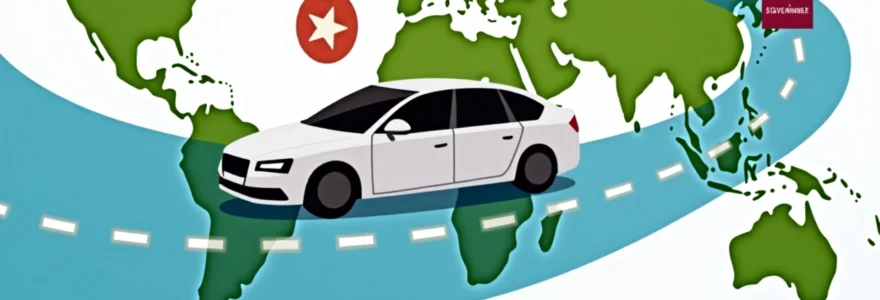Renting a car abroad can open up a world of possibilities for your travels, allowing you to explore at your own pace and venture off the beaten path. However, navigating the process of renting a vehicle in a foreign country can be daunting, especially when faced with unfamiliar regulations and potential language barriers. This comprehensive guide will walk you through the essential steps and considerations for a smooth car rental experience abroad, ensuring you're well-prepared for your international driving adventure.
Choosing the right car rental company abroad
Selecting a reliable car rental company is crucial for a hassle-free experience. Start by considering well-established international brands that operate in multiple countries. These companies often have standardized procedures and a global reputation to maintain, which can provide added peace of mind when renting abroad.
Research of reputable international car rental agencies
Begin your search by looking into major car rental agencies with a strong international presence. Companies like Getaround often have extensive networks and can offer consistent service across different locations. Research their policies, particularly those related to international rentals, to ensure they align with your needs.
Compare prices and package deals online
Once you've identified potential rental companies, use online comparison tools to evaluate prices and package deals. Look for inclusive offers that bundle insurance, GPS, and additional driver fees. Be wary of deals that seem too good to be true, as they may have hidden costs or restrictive terms.
Consider factors beyond just the base rental price:
- Mileage limits and associated fees
- Fuel policies (full-to-full vs. full-to-empty)
- Additional fees for crossing borders or driving in certain areas
- Cost of optional equipment like child seats or GPS units
Check customer reviews and ratings carefully
Before making a final decision, thoroughly review customer feedback for the rental companies you're considering. Pay special attention to reviews from international travelers who have rented in the same country you'll be visiting. Look for consistent themes in the reviews, such as comments on vehicle condition, customer service quality, and transparency in pricing.
A few negative reviews are normal, but a pattern of complaints about hidden fees or poor service should be a red flag.
Understanding rental requirements and restrictions
Each country has its own set of rules and regulations governing car rentals. It's essential to familiarize yourself with these requirements to avoid surprises or disappointments upon arrival. Common factors to consider include:
- Minimum and maximum age restrictions for renters
- Required length of time you must have held your driver's license
- Specific documentation needed, such as an International Driving Permit (IDP)
- Restrictions on where you can drive the rental vehicle (e.g., crossing borders)
Many countries require an IDP in addition to your regular driver's license. This document is essentially a translation of your license and is recognized in numerous countries. Obtain an IDP from your home country before departing for your trip if it's required or recommended for your destination.
Booking your car rental in advance
Securing your rental car well ahead of your trip can offer several advantages, including better rates, a wider selection of vehicles, and the peace of mind that comes with having your transportation sorted before you arrive.
Select appropriate vehicle size and type
Choose a vehicle that suits both your travel needs and the local driving conditions. Consider factors such as:
- Number of passengers and amount of luggage
- Type of terrain you'll be driving on (city streets vs. rural roads)
- Fuel efficiency and local fuel costs
- Ease of parking in your destination (compact cars may be preferable in cities with limited parking)
If you're comfortable driving a manual transmission, opting for a stick shift can often result in significant savings, as automatic vehicles are typically more expensive to rent in many countries.
Specify desired rental dates and location
When booking, be precise about your pick-up and drop-off dates and locations. Many rental companies offer different rates for airport and city center locations. If your travel plans allow for flexibility, compare prices for different pick-up and drop-off points to find the most cost-effective option.
Provide personal information and payment details
Be prepared to provide detailed personal information when making your reservation, including:
- Full name as it appears on your passport
- Contact information (email and phone number)
- Driver's license number and expiration date
- Flight information (if applicable)
Most rental companies require a credit card for the reservation and will place a hold on the card for the estimated rental charges plus a security deposit. Ensure your credit card has sufficient available credit to cover these holds.
Obtaining necessary documentation for international rentals
Proper documentation is crucial for a smooth car rental experience abroad. Gathering and organizing your required documents well in advance can save you time and potential headaches at the rental counter.
Secure valid driver's license and passport
Your driver's license from your home country is typically the primary form of identification required for renting a car abroad. Ensure that your license is valid and will remain so throughout your rental period. Additionally, always carry your passport, as it may be required along with your license.
If you're traveling to a country where an International Driving Permit is required or recommended, obtain one before your trip. IDPs are available through authorized automobile associations in many countries and are valid for one year from the date of issue.
Verify credit card eligibility for deposits
Most car rental companies require a credit card in the renter's name for the security deposit. Debit cards are often not accepted or may require additional documentation. Check with your credit card company about:
- International transaction fees
- Daily spending limits that might affect your ability to secure the rental
- Any car rental insurance benefits provided by your card
Consider purchasing supplemental car rental insurance
While your personal auto insurance or credit card may provide some coverage for rental cars, these policies often have limitations or exclusions for international rentals. Consider purchasing additional coverage to protect yourself from potential financial liability in case of an accident or theft.
Always read the fine print of any insurance policy to understand what is and isn't covered, especially regarding liability and collision damage.
Common types of rental car insurance include:
- Collision Damage Waiver (CDW) or Loss Damage Waiver (LDW)
- Supplemental Liability Protection
- Personal Accident Insurance
- Personal Effects Coverage
Weigh the cost of these insurance options against the potential risks and your personal risk tolerance. In some countries, certain types of insurance may be mandatory for foreign renters.
Familiarizing yourself with local driving regulations
Before getting behind the wheel in a foreign country, it's crucial to understand the local traffic laws and driving customs. Rules of the road can vary significantly from one country to another, and ignorance of the law is not an acceptable excuse for violations.
Key aspects to research include:
- Which side of the road to drive on
- Speed limits and how they're displayed
- Right-of-way rules, especially at roundabouts or intersections
- Parking regulations and restrictions
- Use of headlights during daytime hours
Many countries have specific requirements for safety equipment that must be carried in the vehicle at all times. This may include items such as:
- Reflective safety vests
- Warning triangles
- First aid kits
- Spare bulbs for headlights
Confirm with your rental company that all required safety equipment is provided with the vehicle. If not, you may need to purchase these items separately to comply with local laws.
Familiarize yourself with local road signs and their meanings. While many signs use international symbols, others may be unique to the country or region. A quick study of common road signs can help you navigate more confidently and avoid unintentional traffic violations.
Be aware of specific driving challenges you might encounter in your destination, such as:
- Mountain roads with steep grades and hairpin turns
- Unpaved or poorly maintained roads in rural areas
- Heavy traffic and aggressive driving in major cities
- Wildlife on roads in certain regions
Understanding these potential challenges can help you make informed decisions about your route planning and driving habits. Lastly, research local customs regarding alcohol consumption and driving. Many countries have zero-tolerance policies for drinking and driving, with severe penalties for violations. Always err on the side of caution and avoid consuming any alcohol if you plan to drive.

